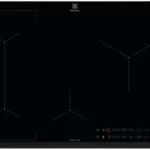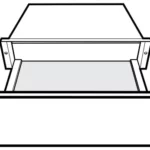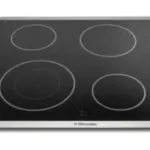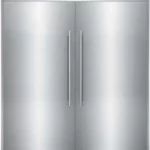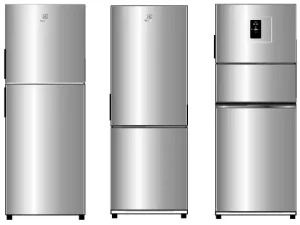
 User Manual
User Manual
Refrigeration
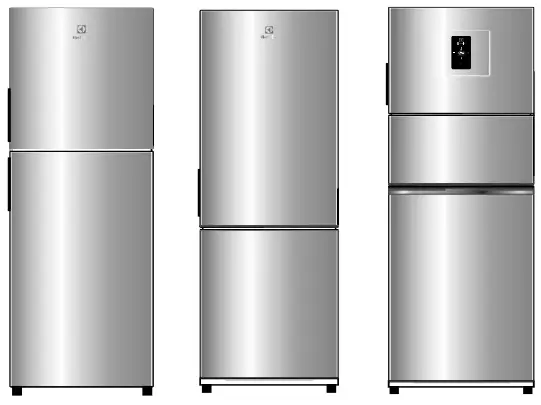
ETB2502H-A, ETB2502H-H, ETB2302H-A,
ETB2302H-H, ETB2802H-A, ETB2802H-H,
ETB3400H-A, ETB3400H-H, ETB3700H-A,
ETB3700H-H, EBB2802H-A, EBB2802H-H,
EBB3400H-A, EBB3400H-H, EBB3700H-A,
EBB3700H-H, EME2800H-A, EME2800H-H,
EME3700H-A, EME3700H-H
EASY WAY TO REGISTER YOUR
PRODUCT WITH YOUR SMARTPHONE
- Photograph the camera icon located on your product’s serial tag, including the 4 dots
 .
.
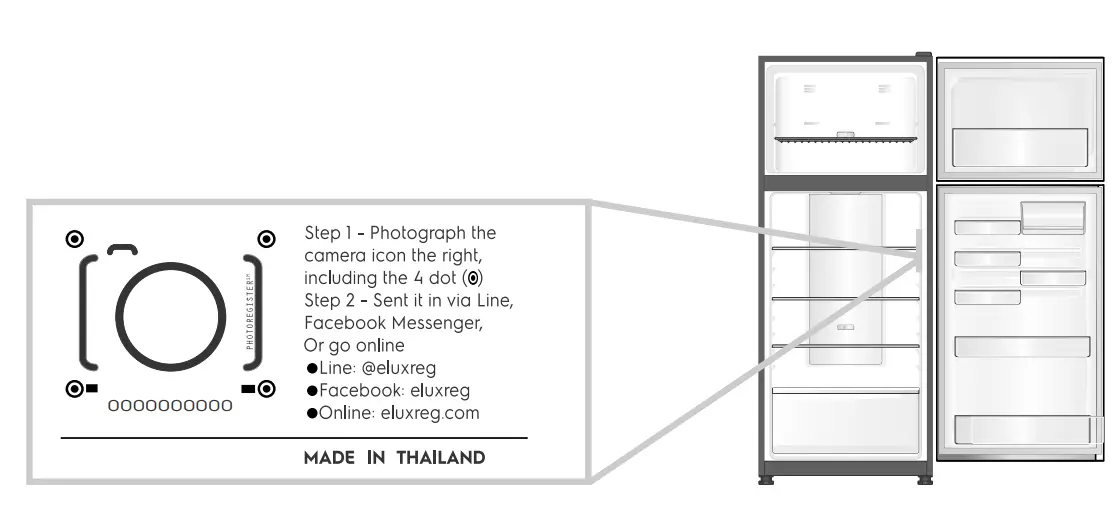
- Send it in via Line, Facebook Messenger, or go online.
 @eluxreg
@eluxreg
 eluxreg
eluxreg
 eluxreg.com
eluxreg.com - Enjoy many privileges.*
“Terms and conditions apply.
Thank You for choosing Electrolux!
Congratulations and thank you for choosing an Electrolux refrigerator/freezer. We are sure you will find your new appliance a pleasure to use. Before you start using the appliance, we recommend you read through the entire user manual which describes the appliance and its many functions. To avoid any unnecessary risks, misuse, or hazards that may be present when using a new electrical appliance, it is important you read the safety instructions carefully. We recommend you keep this user manual for future reference and pass it on to future owners. After unpacking the appliance, please check that it is not damaged. If in doubt, do not use the appliance but contact your local Electrolux Customer Care Centre.
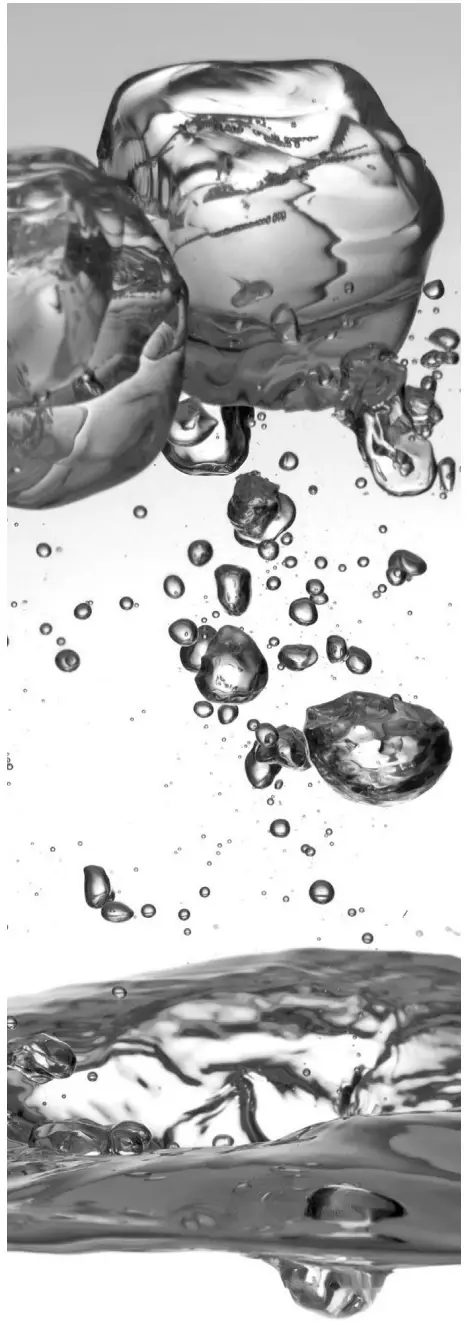
RoHS compliant
Being ensured the permissible content of some toxic chemicals (RoHS compliant) (According to the Circular No. 30/2011/TT-BCT, Vietnam, dated 10th August 2011)
![]() ENVIRONMENTAL TIP
ENVIRONMENTAL TIP
Disposal information for users
Most of the packing materials are recyclable. Please dispose of these materials through your local recycling depot or place them in appropriate collection containers.
If you wish to discard this appliance, please contact your local authorities and ask for the correct method of disposal. These products are RoHS compliant.
Conditions of use
This appliance is intended to be used in household and similar applications such as,
- Staff kitchen areas in shops, offices, and another working environment;
- Farmhouse and by clients in hotels, motels, and other residential type environments;
- Bed and breakfast type environments;
- Catering and similar non-retail applications;
Please read the user manual carefully and keep it in a handy place for later reference. The symbols you see in this manual have the following meanings:
![]() WARNING
WARNING
This symbol indicates information concerning your personal safety.
![]() CAUTION
CAUTION
This symbol indicates information on how to avoid damaging the appliance.
 TIPS AND INFORMATION
TIPS AND INFORMATION
This symbol indicates tips and information about the use of the appliance.
![]() ENVIRONMENTAL TIP
ENVIRONMENTAL TIP
This symbol indicates tips and information about the economical and ecological use of the appliance.
MEANING OF SYMBOLS
![]() This symbol indicates to never do this.
This symbol indicates to never do this.
![]() This symbol indicates to always to this.
This symbol indicates to always to this.
 TIPS AND INFORMATION
TIPS AND INFORMATION
Important: Check for any damages or marks. If you find that the refrigerator is damaged or marked, you must report this within 7 days if you wish to claim for damages/marks under the manufacturer’s warranty. This does not affect your statutory rights.
![]() WARNING
WARNING
![]() If pressurized aerosol containers bear the word ‘Flammable’ and/or a small flame symbol, do not store them inside any refrigerator. If you do so, you may cause an explosion.
If pressurized aerosol containers bear the word ‘Flammable’ and/or a small flame symbol, do not store them inside any refrigerator. If you do so, you may cause an explosion.
When you dispose of refrigerators and freezers, remove all doors. Children can suffocate if they get trapped inside. This refrigerator contains insulation formed with flammable blowing gases. Avoid safety hazards by carefully disposing of this appliance.
![]() WARNING
WARNING
![]() This appliance must be plugged into its own dedicated 220-240V, 50/60Hz AC electrical outlet
This appliance must be plugged into its own dedicated 220-240V, 50/60Hz AC electrical outlet
![]() Ensure that the electrical outlet is properly earthed to the ground. Consult a qualified electrician if you are unsure.
Ensure that the electrical outlet is properly earthed to the ground. Consult a qualified electrician if you are unsure.
![]() Do not use an extension cord or adapter plug.
Do not use an extension cord or adapter plug.
![]() If the power cord is damaged, it must be replaced by the manufacturer, its service agent, or similarly qualified personnel in order to avoid a hazard.
If the power cord is damaged, it must be replaced by the manufacturer, its service agent, or similarly qualified personnel in order to avoid a hazard.
![]() Unplug the appliance before cleaning and before changing the light bulb to avoid electric shock.
Unplug the appliance before cleaning and before changing the light bulb to avoid electric shock.
![]() Never unplug the appliance by pulling on the power cord. Always grip the plug firmly, and pull straight out of the receptacle to prevent damaging the power cord. Choose a location that is not too cold for installation.
Never unplug the appliance by pulling on the power cord. Always grip the plug firmly, and pull straight out of the receptacle to prevent damaging the power cord. Choose a location that is not too cold for installation.
![]() The temperature should be above 10 degrees°C.
The temperature should be above 10 degrees°C.
![]() Put the appliance in a dry place, avoiding areas of high moisture or humidity.
Put the appliance in a dry place, avoiding areas of high moisture or humidity.
![]() Do not place the appliance in frosty or unprotected areas, such as in a garage or on a verandah.
Do not place the appliance in frosty or unprotected areas, such as in a garage or on a verandah.
![]() Do not place the appliance in direct sunlight.
Do not place the appliance in direct sunlight.
![]() Do not place the appliance near stoves, fires, or heaters.
Do not place the appliance near stoves, fires, or heaters.
![]() The plug must be accessible when the appliance is in position.
The plug must be accessible when the appliance is in position.
![]() WARNING
WARNING
This appliance is not intended for use by persons (including children) with reduced physical, sensory or mental capabilities, or lack of experience and knowledge unless they have been given supervision or instruction concerning the use of the appliance by a person responsible for their safety. Children should be supervised to ensure that they do not play with the appliance.
Please follow these tips;
![]() Never let children play with the refrigerator.
Never let children play with the refrigerator.
![]() Never store fizzy drinks in the freezer compartment.
Never store fizzy drinks in the freezer compartment.
![]() Never try to repair the refrigerator on your own.
Never try to repair the refrigerator on your own.
![]() Never use electric heaters or dryers to defrost the freezer because you can receive an electric shock.
Never use electric heaters or dryers to defrost the freezer because you can receive an electric shock.
![]() Never use electrical appliances inside the storage areas.
Never use electrical appliances inside the storage areas.
![]() WARNING
WARNING
Stability Foot
When your refrigerator is in place, wind down the stability foot to the floor to stabilize it. Lift the front of the refrigerator to take the weight off the stability foot, then turn it 1/4 turn further to ensure firm contact with the floor. If you do move the refrigerator, remember to wind it back up, to allow the refrigerator to roll. Remember to reset it when reinstalling.
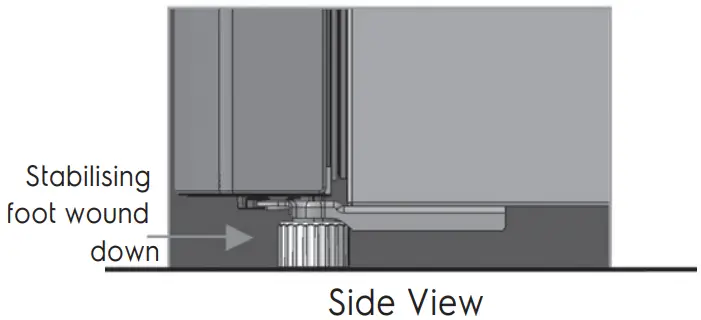
R600A REFRIGERANT WARNING
- This appliance contains flammable R600a refrigerant. Avoid safety hazards by carefully installing, handling, servicing, and disposing of this appliance. If the appliance contains R600a it will be indicated on the rating plate inside the appliance.
- Ensure that the tubing of the refrigerant circuit is not damaged during transportation and installation.
- In the event, any damage accidentally occurs, keep the appliance away from open fires and any devices that produce sparks or arcs and luminaries during normal or abnormal operation, and unplug the appliance at the PowerPoint. Call authorized service for necessary action and advice.
- Leaking refrigerant may ignite the vent area if a leak occurs.
- The room for installing appliances must be at least 1m3 per 8g of refrigerant. The amount and type of refrigerant in the appliance can be found on the rating plate inside the appliance.
- Do not damage the refrigerant circuit.
- Do not use electrical appliances inside the food storage compartments of the appliance, unless they are of the type recommended by the manufacturer.
- Keep ventilation openings, in the appliance enclosure or in the built-in structure, clear of obstruction.
- Do not use mechanical devices or other means to accelerate the defrosting process, other than those recommended by the manufacturer.
![]() WARNING
WARNING
- Do not use a steam cleaner. If live components come in contact with the condensing steam, they may short circuit or cause an electric shock.
- Do not plug the appliance into a timer fitted to the PowerPoint.
- Do not put your appliance on an uneven surface.
- Do not store explosive substances such as aerosol cans with flammable propellant in the appliance.
- Do not store fizzy drinks in the freezer compartment.
- Never try to repair the refrigerator on your own. Use only a qualified or authorized service person for repairs.
- Never use electric heaters or dryers to defrost the freezer because you can receive an electric shock.
Installing Your New Refrigerator
Clean the refrigerator thoroughly according to instruction, and wipe away any dust that has accumulated during shipping.
Check that the floor is level. If it is not then adjust the provided leveling leg so the product is level and stable.
We recommend that you let your refrigerator run for two to three hours before you put any food in it. This will allow you to check that it is operating properly and that enough cool air is going to the freezer. Clearance around your Top and Bottom Mount refrigerator
- Allow a minimum of 30mm clearance on both sides of the refrigerator.
- Allow 50mm clearance at the back of the refrigerator.
- Allow a minimum of 10mm clearance above the hinge cover.
- If you do not have a cupboard with an allowance for airflow above the refrigerator, the recommended clearance area on top increases to 90 mm.
- When positioned in a corner area, spacing of 350mm on the hinge side will allow the doors to open enough to enable the removal of bins and shelves.

NOTE: In an installation where both sides and the rear of the refrigerator are not enclosed by cabinetry eg the refrigerator is placed against a wall, the clearance between the rear of the refrigerator and the wall should not be greater than 75mm.
You refrigerator uses energy efficient components that may produce different noises (Refer to “Noises” page for examples) to your old refrigerator. Occasionally a gurgling sound of refrigerator flowing or the sound of parts expanding and contracting can be hard. These noises are quite normal.
Cleaning Your Refrigerator
Exterior
You should only clean your refrigerator with lukewarm soapy water and a soft cloth. Rinse with clean water and then wipe the surface with a soft clean cloth to remove any soap residue.
Interior
You should clean the refrigerator interior regularly. Wash the interior with a soft cloth and lukewarm soapy water. Thoroughly dry all surfaces and removable parts. Avoid getting water on refrigerator controls. If you have taken out any removable parts, replace them and switch the power on before restocking the refrigerator with food. Naturally, you should keep the interior of your refrigerator Hygenic by promptly and thoroughly wiping up any food spills.
![]() WARNING
WARNING
Naver uses hot water, solvents, commercial, caustic or abrasive cleaners, or scourers to clean this appliance as they will damage it. Many commercially available cleaning products and detergents contain solvents that will damage your refrigerator. When cleaning, use only a soft cloth and lukewarm soapy water.
TEMPERATURE CONTROL
When you first turn on the refrigerator, set both the refrigerator and freezer temperature control to normal. Please refer to the below section for information on adjusting refrigerator and freezer temperature.
 TIPS AND INFORMATION
TIPS AND INFORMATION
Changing setting
When you change the temperature settings, make small adjustments and wait 24 hours before assessing whether you need to make any further changes.
For Top Freezer models
Freezer temperature setting recommendation
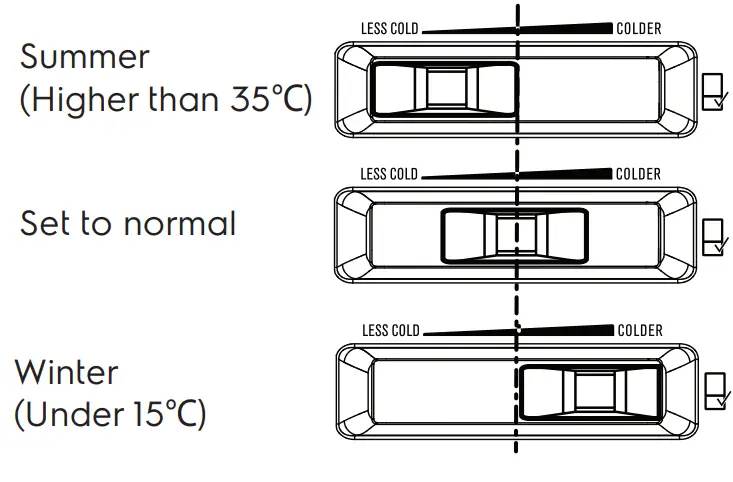
Refrigerator temperature adjustment
- Select the refrigerator control
- Slide the control to the left to set it to colder
- Slide the control to the right to set less cold
Refrigerator temperature setting recommendation
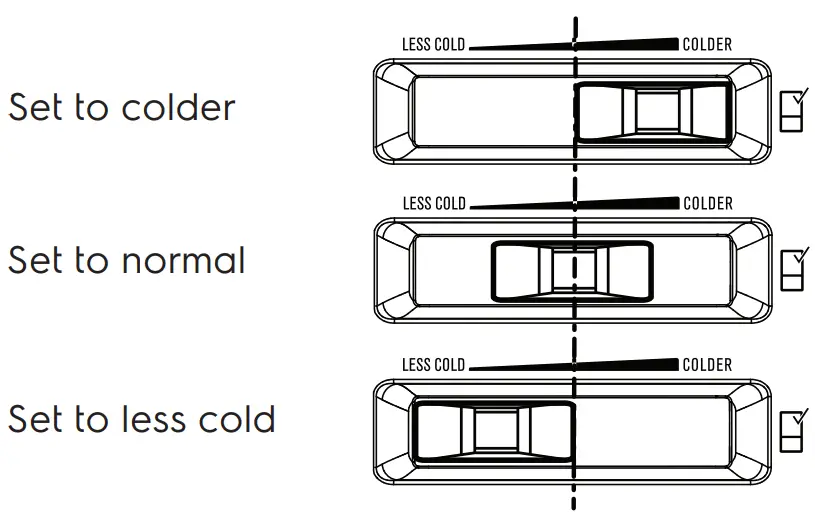
For Bottom Freezer models
Freezer temperature setting recommendation
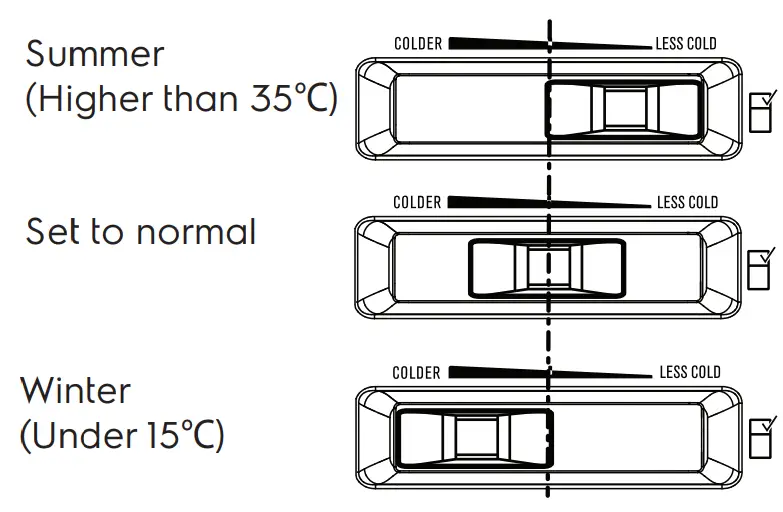
Refrigerator temperature adjustment
- Select the refrigerator control
- Slide the control to the left to set it to less colder
- Slide the control to the right to set cold
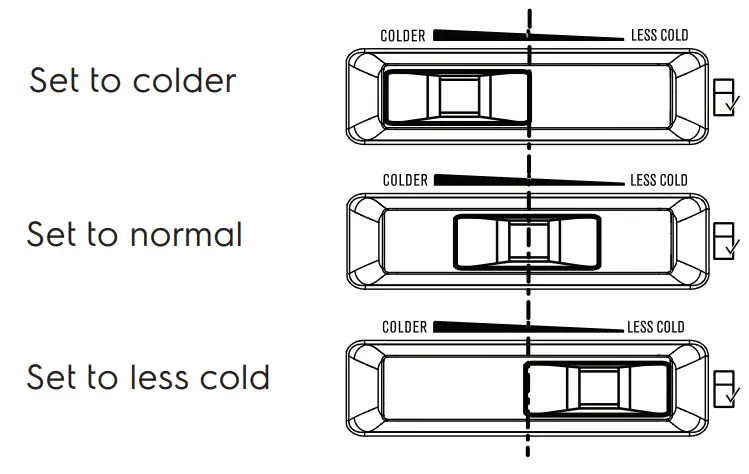
 TIPS AND INFORMATION
TIPS AND INFORMATION
Setting the freezer temperature to colder is not recommended for normal or very hot climate conditions as this will limit the cooling capacity to other sections of the refrigerator. In a very cold climate, the freezer will need to be set colder.
DOOR ALARM
If the refrigerator door is left open longer than two minutes, a buzzer will sound. Re-set the alarm by pressing the Light switch or closing the door.
TEMPERATURE CONTROL
For Multi Top Freezer models
We recommend that when you start your refrigerator for the first time, the temperature for the refrigerator is set to 3°C and the freezer to -18°C. If you want to change the temperatures, use the instructions below. You should make only small adjustments and wait 24 hours to see whether you need to make further changes.
 TIPS AND INFORMATION
TIPS AND INFORMATION
When you set a temperature, you set an average temperature for the whole appliance cabinet. Temperatures inside each compartment vary, depending on how much food you store and where you place it. High or low room temperature may also affect the actual temperature inside the appliance.
How to select the compartment to set temperature
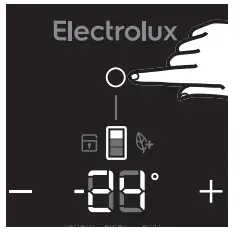
Use the “Compartment Select” button to highlight the freezer, middle or fresh food compartment temperature setting.
| Compartment Icon Display | ||
| Freezer Selected |
Middle Selected |
Food Selected |
Adjusting the freezer temperature
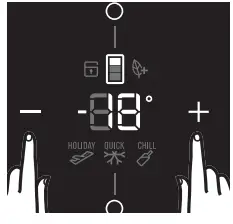
- Press the left “<” arrow button to make the freezer colder in 1°C steps.
- Press the right “>” arrow button to make the freezer warmer in 1°C steps.
The Freezer temperature range: -23°C to -14°C
Adjusting the middle temperature
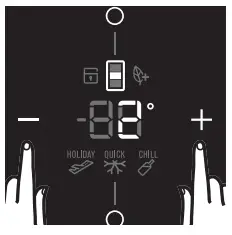
- Press the left “<” arrow button to make the middle colder in 1°C steps.
- Press the right “>” arrow button to make the middle warmer in 1°C steps.
The Middle-temperature range: -12°C to 3°C
Adjusting the refrigerator temperature
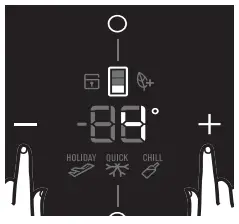
- Press the left “<” arrow button to make the middle colder in 1°C steps.
- Press the right “>” arrow button to make the middle warmer in 1°C steps.
The Refrigerator temperature range: 0°C to 7°C
 TIPS AND INFORMATION
TIPS AND INFORMATION
Coldest freezer setting is not recommended in normal and very hot climates as this will limit the cooling to the refrigerator sections. In very cold climates the freezer will need to be set colder.
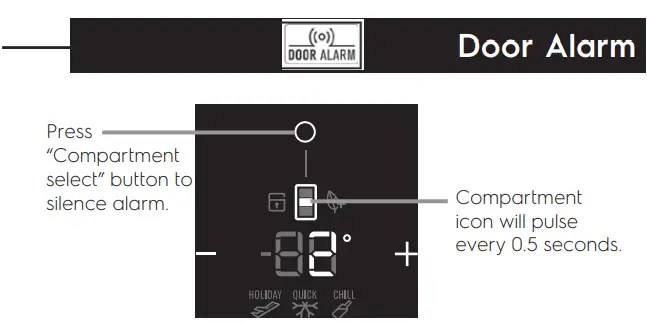
If the fresh food door is left open longer than two minutes. The buzzer will sound and the “Compartment icon” and “Compartment select button” will pulse every 0.5 seconds. Press “Door Switch” or close the door to stop the alarm. Press any button to silence the alarm. The alarm sound will mute for 8 minutes if the door is still open. If the alarm resounds then pressing the button again will silence the alarm for a further 8 minutes. When door alarm is activated, all other functions are locked out.
Energy efficiency
Your appliance has been designed with energy efficiency in mind and can operate in any of three modes (NORMAL, ECO, HOLIDAY), depending on the level of efficiency sought.
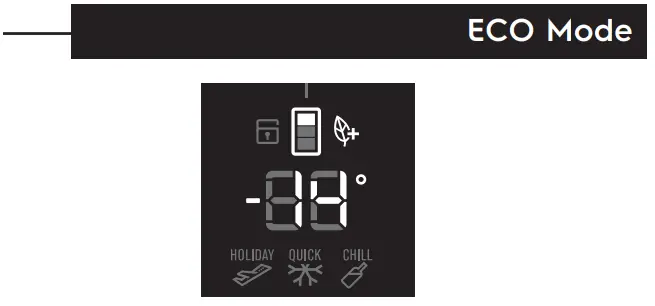
When the green “ECO” icon is illuminated, it means your the appliance is set to run in an ecologically
The “ECO” icon will appear when setting Freezer compartment temperature from -18°C to -17°C, Middle compartment temperature from -2°C to 4°C, and Fresh food compartment temperature from 3°C to 7°C.
If any compartment temperature setting is outside of this range, or the Quick Freeze function is active, the “ECO” icon will disappear.
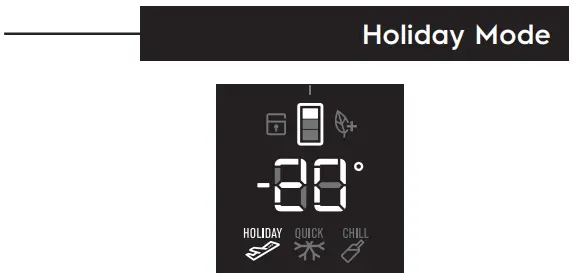
Holiday mode is designed to take advantage of maximum energy efficiency when you will be away from your appliance for an extended period. Press the “Modes” button to select holiday mode until the “HOLIDAY” icon illuminates. The “ECO” icon stays on if the temperature setting is still in the Eco mode range. Holiday mode can be activated while the door is opened. Manually enabled Holiday mode must be manually deactivated. Automatic Holiday mode (30hours of human interaction) deactivates if the button is pressed on the display or the door is opened.
NOTE: Holiday mode is designed to operate with minimum door opening (e.g. if the fridge is used for long-term storage), frequent door opening in Holiday mode could lead to food spoilage.
Drink Chill Mode
Use the Drink Chill Model for chilling drinks in the freezer, sounding an alarm after 20 minutes (default) to remind you to remove the bottles. Press the “Modes” button to select drinks chill mode. “CHILL” icon will illuminate. The numerical display will change to “20”
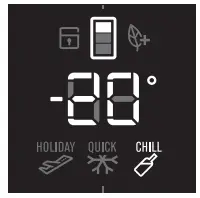
The minimum time adjustment is 5 minutes and the maximum time is 30 minutes.
Adjust the timer by using the arrow buttons “<” and “>”.
Each button touch will add or decrease 5 minutes to the chill time.
Suggested chilling times:
- 10 minutes for cans of drink
- 20 minutes for bottles of wine
- 30 minutes for bottles of soft drink
NOTE: When the drinks chill alarm is activated, all other functions are locked out.
Quick Freeze Mode
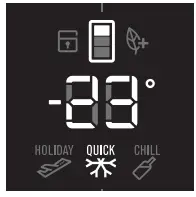
Use the quick freezer mode when you add a large amount of food to the freezer compartment. The freezer compartment temperature will show -23°C. (This temperature cannot be changed while pressing the “Modes” button to select quick-freeze will now operate for 90 minutes then switch to normal operation.)
LED Lighting
Your refrigerator is fitted with long-life LED lighting. In the unlikely event, the LED lights should ever fail, then the LED lights need to be serviced by a qualified technician. Refer to page 14 for contact details.
FEATURES
This section tells you how to make the most of the many useful features of the refrigerator and how to clean them. You can adjust the refrigerator bins to meet different storage needs.
Door storage bins (shelves)
Both the refrigerator and freezer have door storage bins. You can adjust the refrigerator bins to meet different storage needs. All the door bins are completely removable for cleaning. If you want to remove or adjust a bin, lift and tilt to remove. To replace, tilt the top and push the bin down until the support lugs lock it in place.
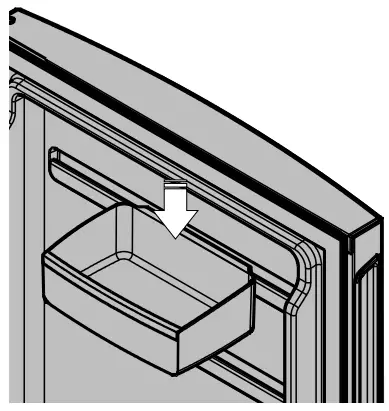
Store safe compartment (where fitted)
You can use this compartment to store food and other items. To operate the lock, push up to open and down to lock.
Crisper bin
Storing vegetables
Use the crisper bin to store vegetables, fruits, or small items. You can adjust the humidity inside the bin by sliding the humidity control.
Storing fruits and small items
You can store fruits in the crisper bin, but do remember to lower the humidity via the humidity can be adjusted by sliding the lever on the humidity control.
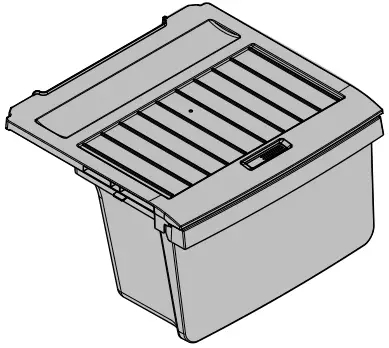
Deodorizer
Your refrigerator is fitted with a Nano copper deodorizer to assist with the removal of food odours inside your refrigerator. Keeping the food covered and wrapping it in plastic will also help to reduce the odors inside your refrigerator.
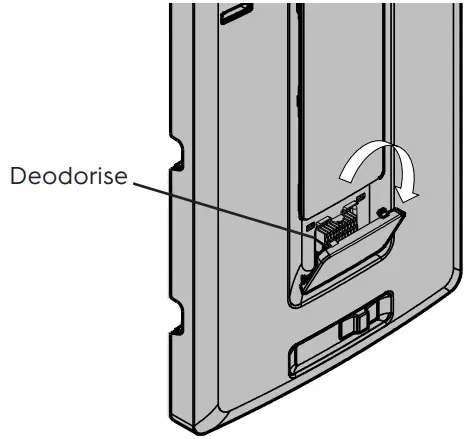
TTOP FREEZER FEATURES
- ETB2302H-A
- ETB2302H-H
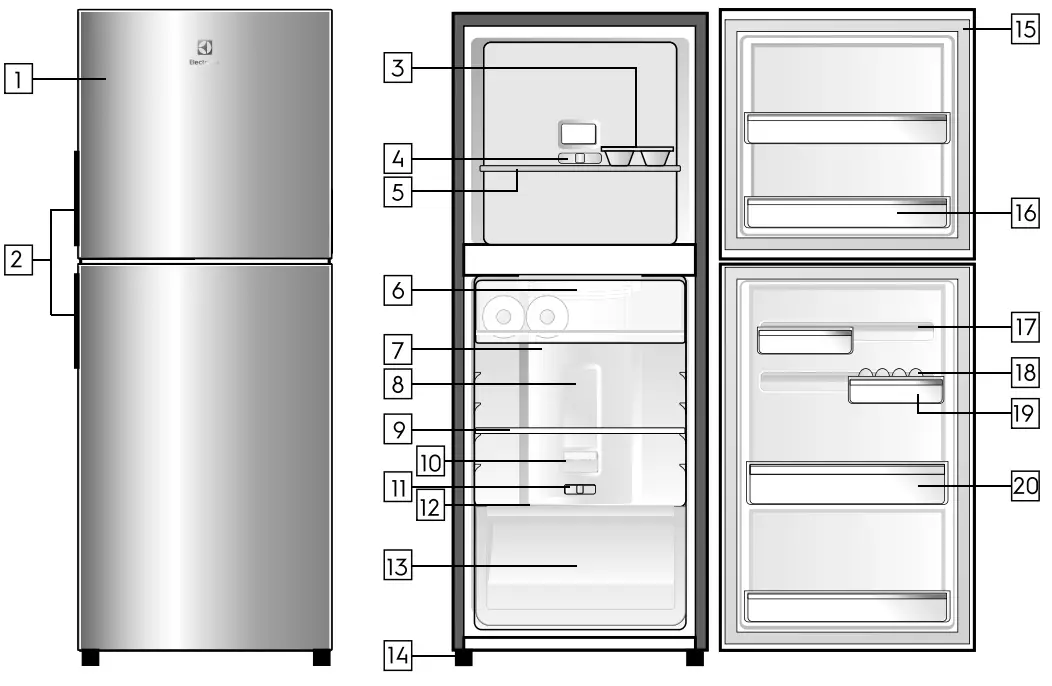
The details of the refrigerator feature:
- Doors
- Door Handles
- Ice Tray
- Slide Control Freezer
- Freezer Shelf
- Chill room
- Multi Flow
- Refrigerator Light
- Shelf
- Deodoriser Cover Refrigerator
- Slide Control Refrigerator
- Humidity Slide
- Crisper
- Feet
- Gaskets
- Door Bins
- FlexStor Rails
- Egg Tray
- Bottle Bins
- FlexStor Bins
- ETB2502H-A
- ETB2502H-H
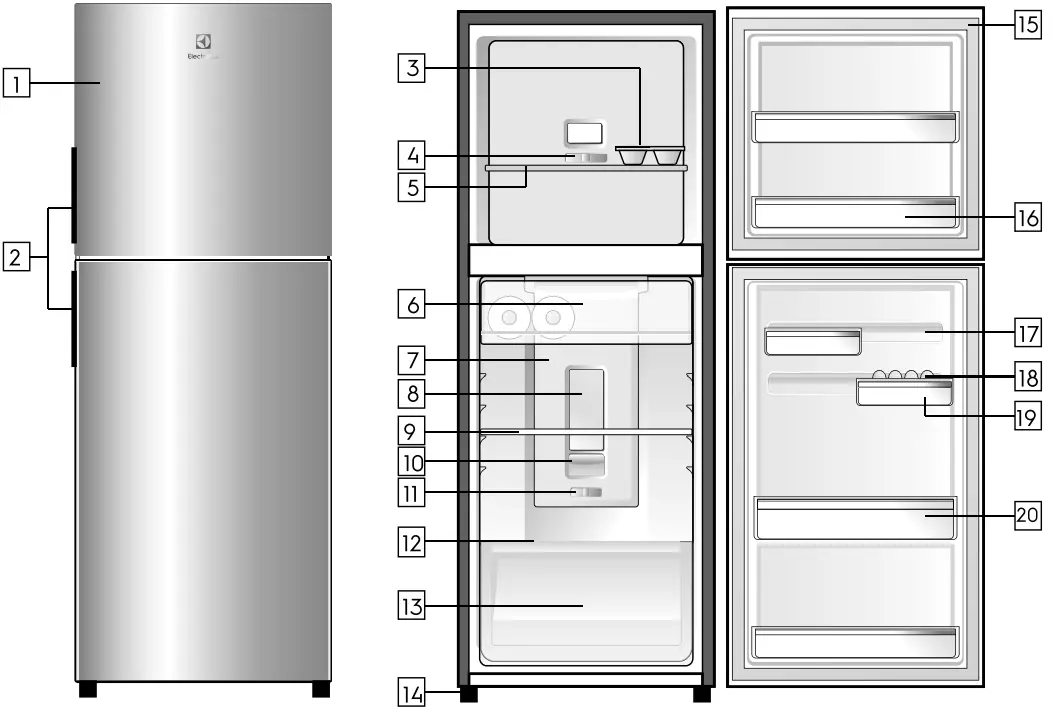
The details of the refrigerator feature:
- Doors
- Door Handles
- Ice Tray
- Slide Control Freezer
- Freezer Shelf
- Chill room
- Multi Flow
- Refrigerator Light
- Shelf
- Deodoriser Cover Refrigerator
- Slide Control Refrigerator
- Humidity Slide
- Crisper
- Feet
- Gaskets
- Door Bins
- FlexStor Rails
- Egg Tray
- Bottle Bins
- FlexStor Bins
TOP FREEZER FEATURES
- ETB2802H-A
- ETB2802H-H
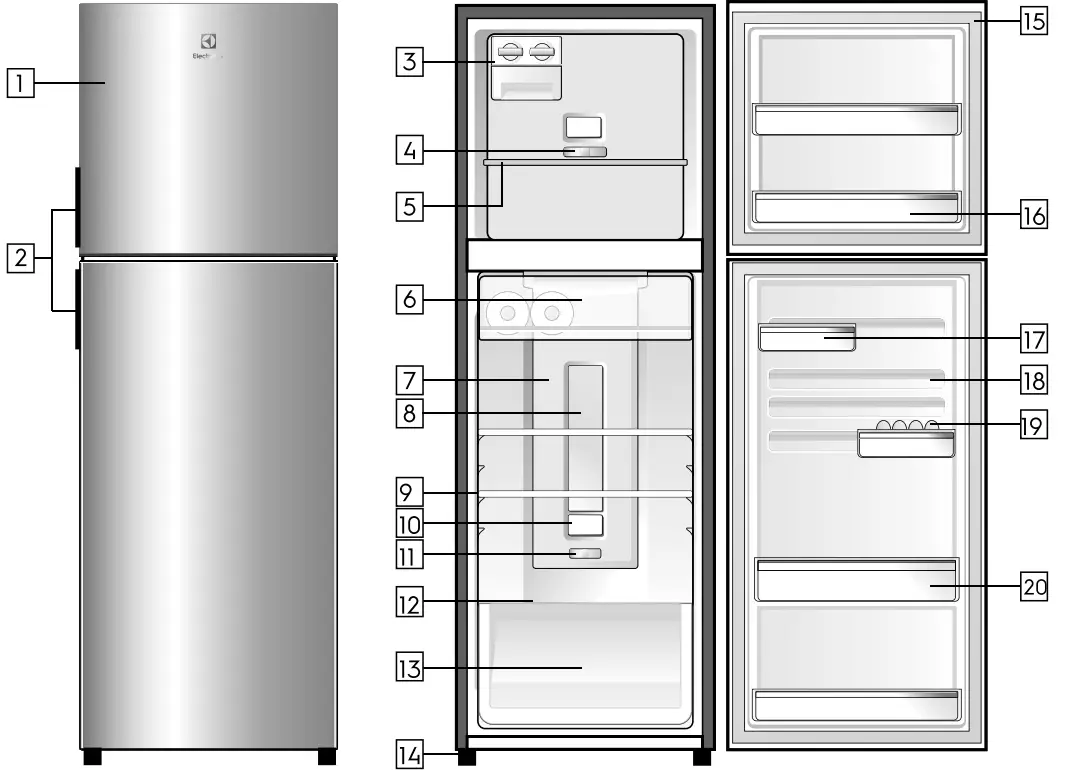
The details of the refrigerator feature:
- Doors
- Door Handles
- Ice Twist & Serve
- Slide Control Freezer
- Freezer Shelf
- Chill room
- Multi Flow
- Refrigerator Light
- Shelves
- Deodoriser Cover Refrigerator
- Slide Control Refrigerator
- Humidity Slide
- Crisper
- Feet
- Gaskets
- Door Bins
- FlexStor Bins
- FlexStor Rails
- Egg Tray
- Bottle Bins
TOP FREEZER FEATURES
- ETB3400H-A
- ETB3400H-H
- ETB3700H-A
- ETB3700H-H
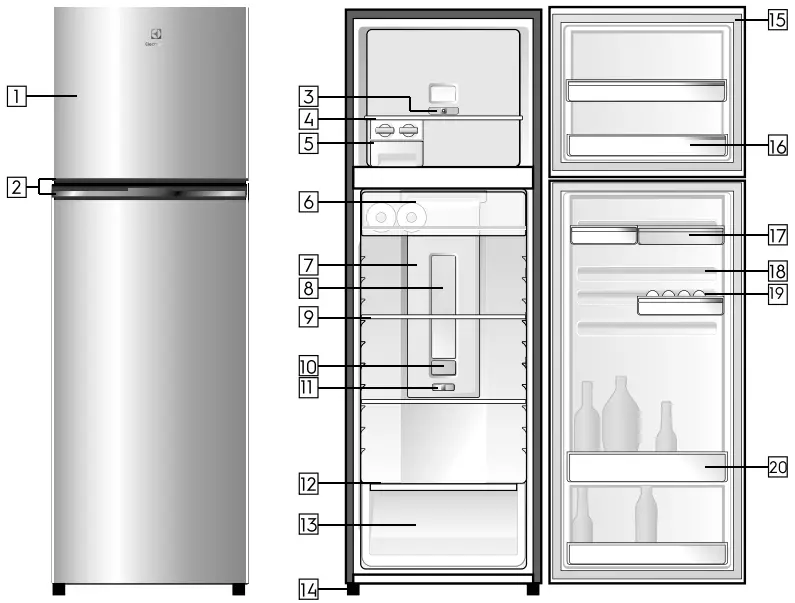
The details of the refrigerator feature:
- Doors
- Door Handles
- Slide Control Freezer
- Freezer Shelf
- Ice Twist & Serve
- Chill room
- Multi Flow
- Refrigerator Light
- Shelves
- Deodoriser Cover Refrigerator
- Slide Control Refrigerator
- Humidity Slide
- Crisper
- Feet
- Gaskets
- Door Bins
- FlexStor Rails
- Egg Tray
- Bottle Bins
- FlexStor Bins
BOTTOM FREEZER FEATURES
- EBB2802H-A
- EBB2802H-H
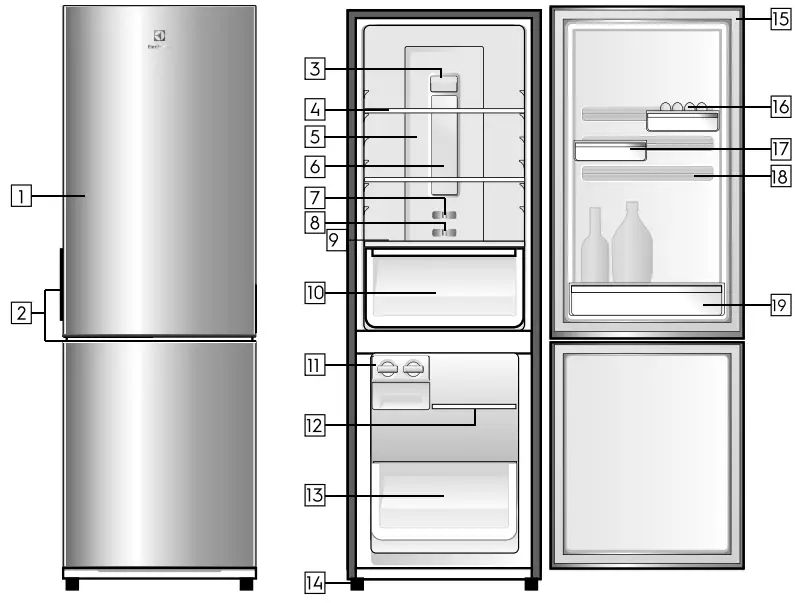
The details of the refrigerator feature:
- Doors
- Door Handles
- Deodoriser Cover
- Shelves
- Multi Flow
- Refrigerator Light
- Slide Control Refrigerator
- Slide Control Freezer
- Humidity Slide
- Crisper
- Ice Twist & Serve
- Freezer Shelf
- Freezer Drawer
- Feet
- Gaskets
- Egg Tray
- FlexStor Bins
- FlexStor Rails
- Bottle Bins
- EBB3400H-A
- EBB3400H-H
- EBB3700H-A
- EBB3700H-H
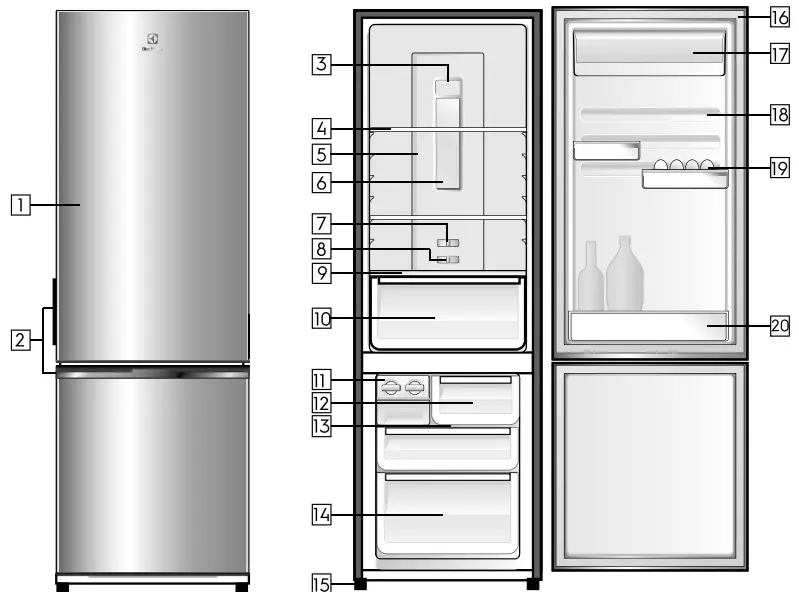
The details of the refrigerator feature:
- Doors
- Door Handles
- Deodoriser Cover
- Shelves
- Multi Flow
- Refrigerator Light
- Slide Control Refrigerator
- Slide Control Freezer
- Humidity Slide
- Crisper
- Ice Twist & Serve
- Meat Drawer
- Crisper
- Freezer Shelf
- Feet
- Gaskets
- FlexStor Bins
- Egg Tray
- FlexStor Rails
- Bottle Bins
MULTI TOP FREEZER FEATURES
- EME2800H-A
- EME2800H-H
- EME3700H-A
- EME3700H-H
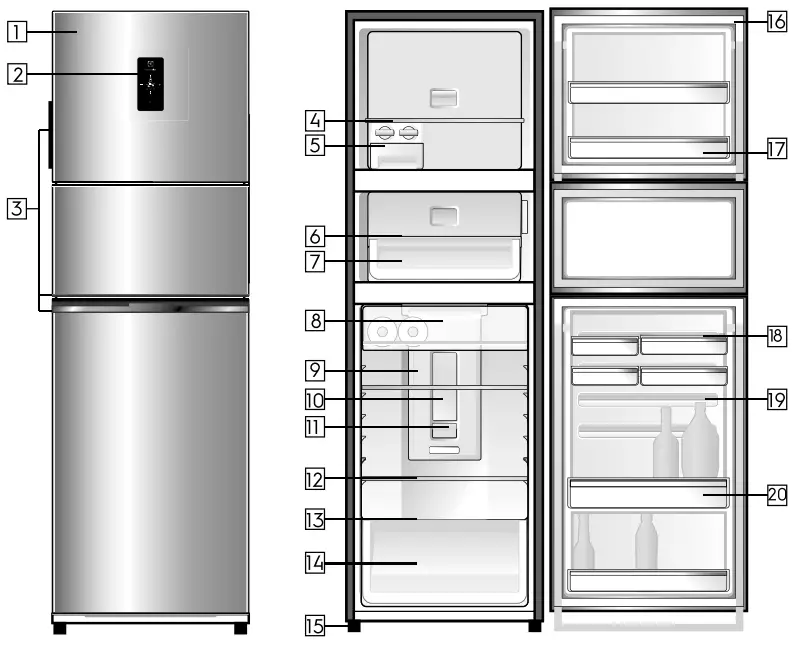
The details of the refrigerator feature:
- Doors
- Temperature Control Refrigerator
- Door handles
- Ice Twist & Serve
- Freezer Shelf
- Mid Door Shelf
- Mid Door Bin
- Chill Room
- Multi Flow
- Refrigerator Light
- Deodoriser Cover refrigerator
- Shelves
- Humidity Slide
- Crisper
- Feet
- Gaskets
- FlexStor Bins
- Egg Tray
- FlexStor Rails
- Bottle Bins
FOOD STORAGE GUIDE
| CATEGORY | PRODUCT | REFRIGERATOR | FREEZER | STORAGE TIPS |
| MEAT | Sausages and Mince | 1-2 Days | 2-3 Months | Keep cold meat at the back of the refrigerator where it is coldest.
Plastic can cause meat to sweat if stored in a refrigerator for more than a day.
Roast can take up to 48 hours to defrost properly, transfer frozen roast to the refrigerator 2 days before use. |
| Chops and Steak | 3-4 Days | 4-6 Months | ||
| Cold Meats | 3-5 Days | 4-6 Months | ||
| Roasts | 3-5 Days | 12 Months | ||
| POULTRY | Chicken | 1-2 Days | 2 Months | If poultry takes on a smell or colour you are unsure about it is best to throw it out.
Whole eggs are not suitable for freezing, slightly beaten eggs may be frozen for four months. |
| Roast Chicken | 3-5 Days | 12 Months | ||
| Eggs | 6 Weeks | Not Suitable | ||
| SEAFOOD | Whole fish and fillets | 2-3 Days | 2 Months | Store in an airtight container or foil.
Never freeze prawns in salty water as this will dehydrate the flesh. |
| Lobster and crabs | 1-2 Days | 2 Months | ||
| Prawns | 1-2 Days | 2 Months | ||
| DAIRY | Milk | Until Expiry Date | Not Suitable | If dairy takes on a smell or color and you are unsure about it, it is best to throw it out.
Depending on the variety hard cheese can last from 2 weeks to 2 months. |
| Yoghurt | 7- 10 Days | Not Suitable | ||
| Hard Cheeses | 2 Weeks – 2 Months | 2 Months (Grated) | ||
| Soft Cheeses | 1-2 Weeks | Not Suitable | ||
| Butter | 8 Weeks | 12 Months | ||
| FRUIT & VEGETABLES | Every fruit and vegetable has a different shelf life. Some stay fresh for a couple of days e.g beans, others can last for a couple of months e.g. onions. | 8-12 Months When freezing chop and blanch in small portions. | Keep vegetables in the crisper and away from the air vents to avoid freezing. | |
| Don’t wash fruit and vegetables before storing them in the refrigerator as this can make them susceptible to rotting. | ||||
| LEFT OVERS | Homemade meals 3-4 Days | 2-6 Months | Store in a sealed container. | |
| Freeze meals in small portion size to limit wastage. | ||||
 IMPORTANT
IMPORTANT
Please note, use this information as a guide only, actual storage times will vary depending on how you use your refrigerator, climatic conditions, and the freshness of the food.
TROUBLESHOOTING
If you find that something is wrong with your refrigerator, you can carry out some easy checks before calling for service. You may be able to fix the problem and save time and costs and spare yourself from some inconvenience.
| Problem | Solution |
| When your appliance is not operating | • Check that the power cord is plugged into the power outlet properly and that the outlet is switched on. • Try running another appliance from the same power outlet. If no power is coming out from the outlet, you may have a blown fuse or tripped your household power supply circuit. • Try adjusting the temperature control to a slightly colder position. • It is normal for the freezer fan to NOT operate during the automatic defrost cycle or for a short time after the refrigerator is turned on. |
| When there is refrigerator noise | • Your refrigerator uses energy-efficient components that may produce different noises from your old refrigerator. • Occasionally, a gurgling sound of the refrigerant flowing or the sound of parts contracting or expanding may be heard. • These sounds are quite normal. If the refrigerator is rattling or making vibrating noises, check that it is level and adjust leveling foot. |
| If there are odours inside the refrigerator | • The interior may need cleaning • Some foods may produce strong odors and need to be tightly sealed. |
| If the temperature in the refrigerator is too warm | • Check that the refrigerator has enough clearance at the sides, back and top. Refer to the installation instructions in this manual. • Refer to ‘Temperature Control’ section. • The door may have been opened for too long or too frequently. • Food containers or packaging may be holding the door |
| If the temperature in the refrigerator is too cold | • Refer to ‘Temperature Control’ section. • Increase the temperature to avoid high energy consumption. |
SERVICE REQUEST
If the problem persists after you have made the above-mentioned checks contact your nearest service center or the dealer from where you bought the refrigerator from. Be ready to quote the model number which is stated on the label found at the inner plastic compartment liner wall of the refrigerator.
Important notice
Before calling a service technician, please check carefully the operating instructions, service booklet, and warranty terms and conditions.
Noise
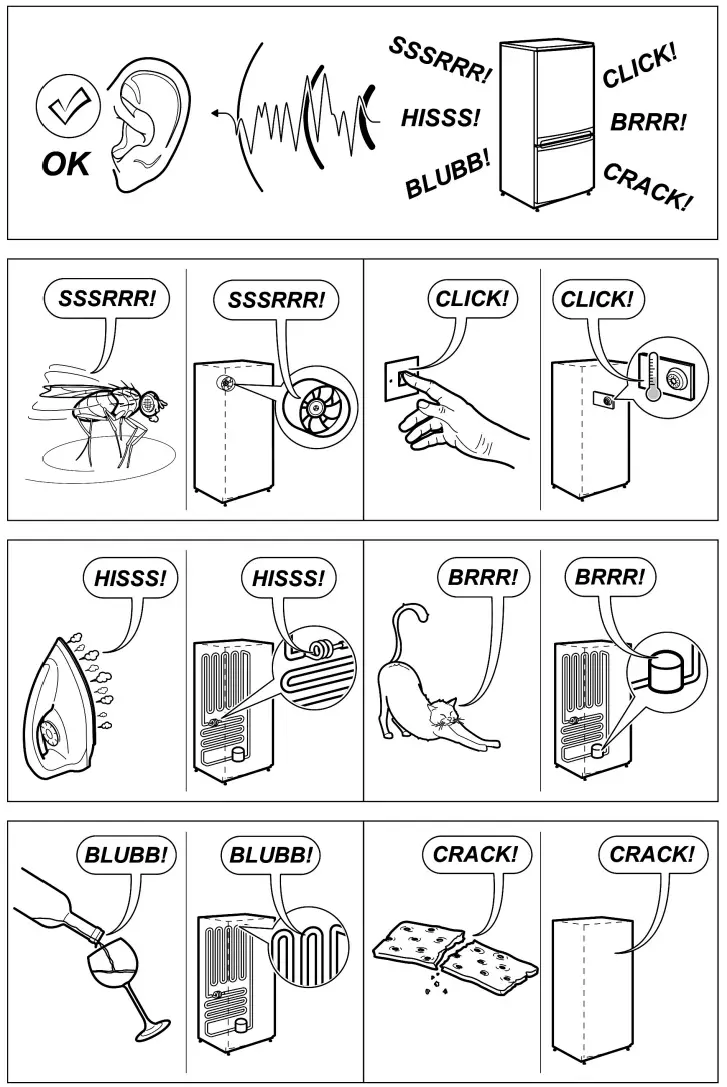
NOTES
![]()
 CHI TIẾT LIÊN HỆ BỘ PHẬN CHĂM SÓC KHÁCH HÀNG CỦA ELECTROLUX
CHI TIẾT LIÊN HỆ BỘ PHẬN CHĂM SÓC KHÁCH HÀNG CỦA ELECTROLUX
Vietnam
Domestic Toll Free: 1800-58-88-99
Tel: (+84 8)3910 5465
Electrolux Vietnam Ltd
Floor 9th, A&B Tower
76 Le Lai Street – Ben Thanh Ward – District 1
Ho Chi Minh City Vietnam
Office Tel: (+84 8) 3910 5465
Office Fax: (+84 8) 3910 5470
Email: [email protected]
Share more of our thinking at electrolux.com.
P/No: A12081643
OM Refresh III_VT.indd 12
7/6/18 9:02 AM
7/6/2561 BE 09:25
